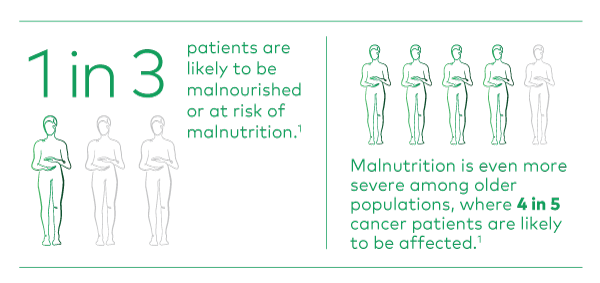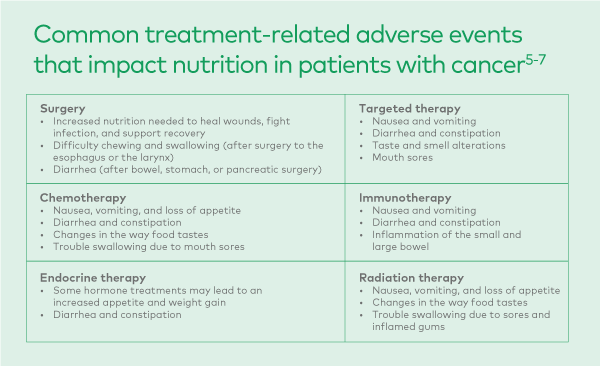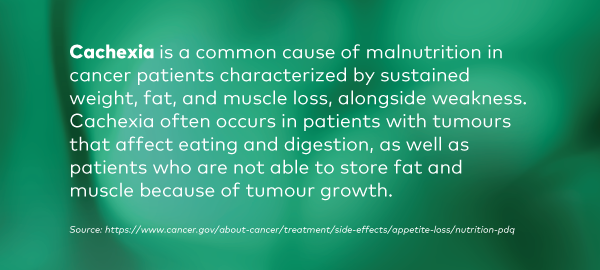1. Medical Nutrition International Industry. Value of medical nutrition in oncology – Evidence dossier 2020. Available at: https://www.medicalnutritionindustry.com/files/user_upload/documents/cancer/MNI_oncology_dossier_2020.pdf. Accessed October 2022
2. Muscaritoli M, et al. ESPEN practical guideline: Clinical nutrition in cancer. Clin Nutr 2021;40(5):2898–2913.
3. Medical Nutrition International Industry. Better care through better nutrition: Value and effects of medical nutrition. Available at: https://www.medicalnutritionindustry.com/files/user_upload/documents/medical_nutrition/MNI_Summary_Booklet_2018_FINAL_HR.pdf. Accessed October 2022.
4. Coa KI, et al. (2015). The impact of cancer treatment on the diets and food preferences of patients receiving outpatient treatment. Nutr Cancer 2015;67(2):339–353.
5. National Cancer Institute. Nutrition in cancer care (PDQ®) – Patient version. Available at: https://www.cancer.gov/about-cancer/treatment/side-effects/appetite-loss/nutrition-pdq. Accessed October 2022.
6. Cancer Research UK. How treatment causes diet problems. Available at: https://www.cancerresearchuk.org/about-cancer/coping/physically/diet-problems/about/how-treatment-causes-diet-problems. Accessed October 2022.
7. Cancer Research UK. Side effects of hormone therapy in women. Available at: https://www.cancerresearchuk.org/about-cancer/cancer-in-general/treatment/hormone-therapy/side-effects-women. Accessed October 2022.
8. Bauer JD, et al. Evidence based practice guidelines for the nutritional management of cancer cachexia. Nutr Diet 2006;63(S2):S3–S32.
9. August DA, Huhmann, M. B. ASPEN clinical guidelines: Nutrition support therapy during adult anticancer treatment and in hematopoietic cell transplantation. JPEN J Parenter Enteral Nutr 2009;33(5):472–500
10. National Institute for Health and Care Excellence (NICE). Clinical guideline 32. Nutrition support for adults: Oral nutrition support, enteral tube feeding and parenteral nutrition. August 2017. Available at: https://www.nice.org.uk/guidance/cg32. Accessed October 2022.
11. Blackwood HA, Hall CC, Balstad TR, Solheim TS, Fallon M, Haraldsdottir E, et al. A systematic review examining nutrition support interventions in patients with incurable cancer. Supportive Care in Cancer. 2020;28(4):1877-89.
12. Icard P, Schussler O, Loi M, Bobbio A, Lupo AM, Wislez M, et al. Pre-disease and pre-surgery BMI, weight loss and sarcopenia impact survival of resected lung cancer independently of tumor stage. Cancers (Basel). 2020;12(2).
13. van der Werf A, Langius JAE, Beeker A, et al. The effect of nutritional counseling on muscle mass and treatment outcome in patients with metastatic colorectal cancer undergoing chemotherapy: A randomized controlled trial. Clin Nutr. 2020;39(10):3005-3013.






